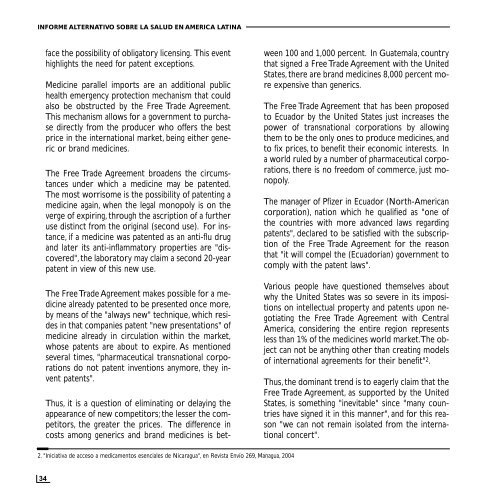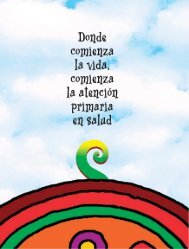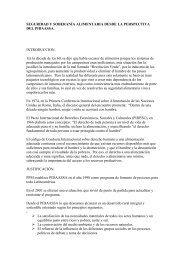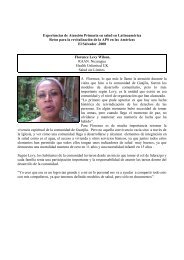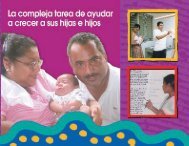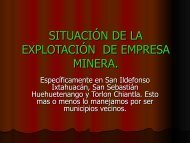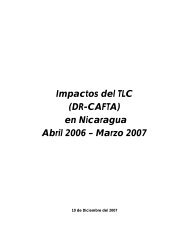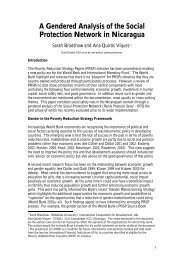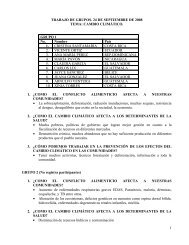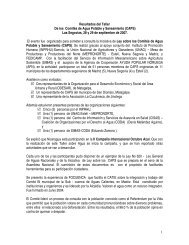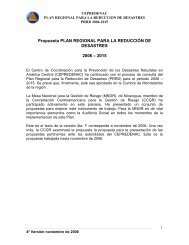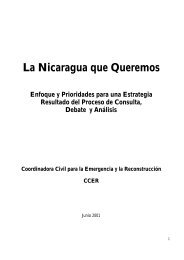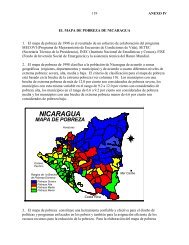Download - CISAS | Centro de Información y Servicios de AsesorÃa ...
Download - CISAS | Centro de Información y Servicios de AsesorÃa ...
Download - CISAS | Centro de Información y Servicios de AsesorÃa ...
You also want an ePaper? Increase the reach of your titles
YUMPU automatically turns print PDFs into web optimized ePapers that Google loves.
INFORME ALTERNATIVO SOBRE LA SALUD EN AMERICA LATINAface the possibility of obligatory licensing. This eventhighlights the need for patent exceptions.Medicine parallel imports are an additional publichealth emergency protection mechanism that couldalso be obstructed by the Free Tra<strong>de</strong> Agreement.This mechanism allows for a government to purchasedirectly from the producer who offers the bestprice in the international market, being either genericor brand medicines.The Free Tra<strong>de</strong> Agreement broa<strong>de</strong>ns the circumstancesun<strong>de</strong>r which a medicine may be patented.The most worrisome is the possibility of patenting amedicine again, when the legal monopoly is on theverge of expiring, through the ascription of a furtheruse distinct from the original (second use). For instance,if a medicine was patented as an anti-flu drugand later its anti-inflammatory properties are "discovered",the laboratory may claim a second 20-yearpatent in view of this new use.The Free Tra<strong>de</strong> Agreement makes possible for a medicinealready patented to be presented once more,by means of the "always new" technique, which resi<strong>de</strong>sin that companies patent "new presentations" ofmedicine already in circulation within the market,whose patents are about to expire. As mentionedseveral times, "pharmaceutical transnational corporationsdo not patent inventions anymore, they inventpatents".Thus, it is a question of eliminating or <strong>de</strong>laying theappearance of new competitors; the lesser the competitors,the greater the prices. The difference incosts among generics and brand medicines is between100 and 1,000 percent. In Guatemala, countrythat signed a Free Tra<strong>de</strong> Agreement with the UnitedStates, there are brand medicines 8,000 percent moreexpensive than generics.The Free Tra<strong>de</strong> Agreement that has been proposedto Ecuador by the United States just increases thepower of transnational corporations by allowingthem to be the only ones to produce medicines, andto fix prices, to benefit their economic interests. Ina world ruled by a number of pharmaceutical corporations,there is no freedom of commerce, just monopoly.The manager of Pfizer in Ecuador (North-Americancorporation), nation which he qualified as "one ofthe countries with more advanced laws regardingpatents", <strong>de</strong>clared to be satisfied with the subscriptionof the Free Tra<strong>de</strong> Agreement for the reasonthat "it will compel the (Ecuadorian) government tocomply with the patent laws".Various people have questioned themselves aboutwhy the United States was so severe in its impositionson intellectual property and patents upon negotiatingthe Free Tra<strong>de</strong> Agreement with CentralAmerica, consi<strong>de</strong>ring the entire region representsless than 1% of the medicines world market.The objectcan not be anything other than creating mo<strong>de</strong>lsof international agreements for their benefit" 2 .Thus, the dominant trend is to eagerly claim that theFree Tra<strong>de</strong> Agreement, as supported by the UnitedStates, is something "inevitable" since "many countrieshave signed it in this manner", and for this reason"we can not remain isolated from the internationalconcert".2. "Iniciativa <strong>de</strong> acceso a medicamentos esenciales <strong>de</strong> Nicaragua", en Revista Envío 269, Managua, 200434


